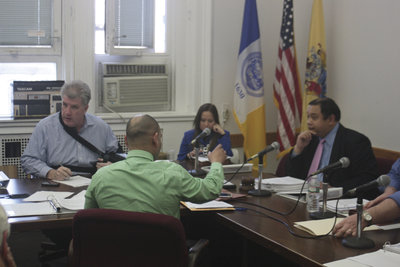The City Council voted Wednesday to accept Mayor Steve Fulop’s $501 million municipal budget.
Long a critic of the previous administration, Fulop is presenting his own vision of the future for Jersey City. According to Fulop, this budget will reduce local property taxes by 2.1 percent, and actually offers the City Council – in whose hands the budget rests – an opportunity to reduce those taxes by as much as 5.6 percent.
This budget does not, however, include school or county taxes, which could counteract the cut and make overall taxes rise. Property owners in Jersey City pay a tax rate determined by a combination of three budgets: The city budget, the school budget and the county budget. The county executive introduced the county budget on March 11 that will likely increase taxes in Jersey City.
“We worked hard to produce this first budget that lowers taxes and creates a pathway toward fiscal stability,” said Fulop. “Most importantly, we are working with the council in a partnership to develop meaningful reductions over the next few years as well.”
“We’re moving in a positive direction.” – Mayor Steven Fulop
____________
The introduction went more swiftly than in past years, when often the council did not receive the budget until June.
The 2014 Jersey City Municipal budget includes $118 million of new and permanent ratables (or taxpaying properties), and the administration is committed to growing the tax base even further through progressive development policies, according to Fulop.
“This is one of the most important responsibilities we have in establishing taxes, and this is the initial working document, which we will be working through the for rest of the year,” Fulop said.
He called it a responsible document that sets the vision for this year and the following year.
“This is something that we will work together on to see what makes sense,” Fulop said.
The city saw an increase in the ratable base of $118 million last year, the highest increase of any municipalities in the state. This increase, combined with some previously tax abated properties starting to pay full taxes, accounts for the tax reduction. If more people are contributing, each pays less.
“A number of properties are coming off abatements, and we do not intend to renew them as we have done in the past,” Fulop said.
While this will help in terms of municipal taxes, it also positions Jersey City to see the highest increase in county taxes this year as well. Cities pay into the county tax base partly based on the value of their taxable properties, or ratables.
“This is the reason I am against all abatements, because the county tax board does not include them when they strike the budget.” said Yvonne Balcer, who frequently attends council meetings and caucuses. “Luckily for Jersey City taxpayers, we are getting a break when abatement expires and its ratable base is added to the tax rolls. Unfortunately, Mayor Fulop, like his predecessors, continues to award abatements. While on one hand he states taxes will drop due to expired abatements, the other hand he continues to award abatements tied to his tier program in which developers can ‘buy’ an additional 10 years, extending the tax abatement to 20 to 30 years.”
A work in progress
While the council will have the opportunity to further reduce taxes to about 5.6 percent, this would involve approving some controversial proposals such as awarding the city’s ambulance contract to McCabe Ambulance rather than to Jersey City Medical Center.
McCabe has offered to pay the city to cover fire responder calls made by the Jersey City Fire Department, where as Jersey City Medical Center has opted to perform its own first responder duties.
The budget also reflects cost savings from the restructuring of city government, including the creation of a Department of Public Safety, which merged the police and fire departments. In 2014, the administration will begin the consolidation of autonomous agencies – beginning with the Parking Authority for further cost savings and efficiency.
Also reflected in the budget is the largest total investment in recreation within the last five years and the largest percent increase in funding since 1999.
According to Fulop, “We have created a variety of new programs and summer jobs for youth. What’s more, the administration is making the largest investment in parks in decades, with $6 million in grant and capital funds allocated toward the renovation of 13 parks across the city.”
Fulop said, “While the administration has been committed to lowering taxes and restructuring government to save taxpayer dollars, we have also been focused on increasing services and programs for our residents. By reducing costs and aggressively seeking outside grant funding, we are able to expand recreation, improve our parks, and develop important health initiatives.”
He said the increase funding in this budget will also go toward providing summer jobs for the city’s youth.
Illustrating fiscal responsibility, the 2014 budget also includes a $2 million allocation toward retirement payouts – the first time such funds have been budgeted since 2010.
“As we work with the council toward a long-range fiscal plan, we will include responsible projections for anticipated future liabilities minimizing last minute budget gaps,” Fulop said.
Fulop said this budget relies less on land sales than in the past, noting that the city anticipates the sale of about $8 million in sale of city owned land this year as opposed to $17 million in last year’s budget.
He said his goal is to eliminate using land sales as a source of municipal revenue.
“We’re moving in a positive direction,” he said.
“We have outlined things that would mean additional savings, but these will be part of the dialogue,” he added.
In the past, the mayor simply handed over the budget to the city council, but Fulop said he would like this to be a dialogue between the council and the mayor’s office resulting in the final budget.
Al Sullivan may be reached at asullivan@hudsonreporter.com.
